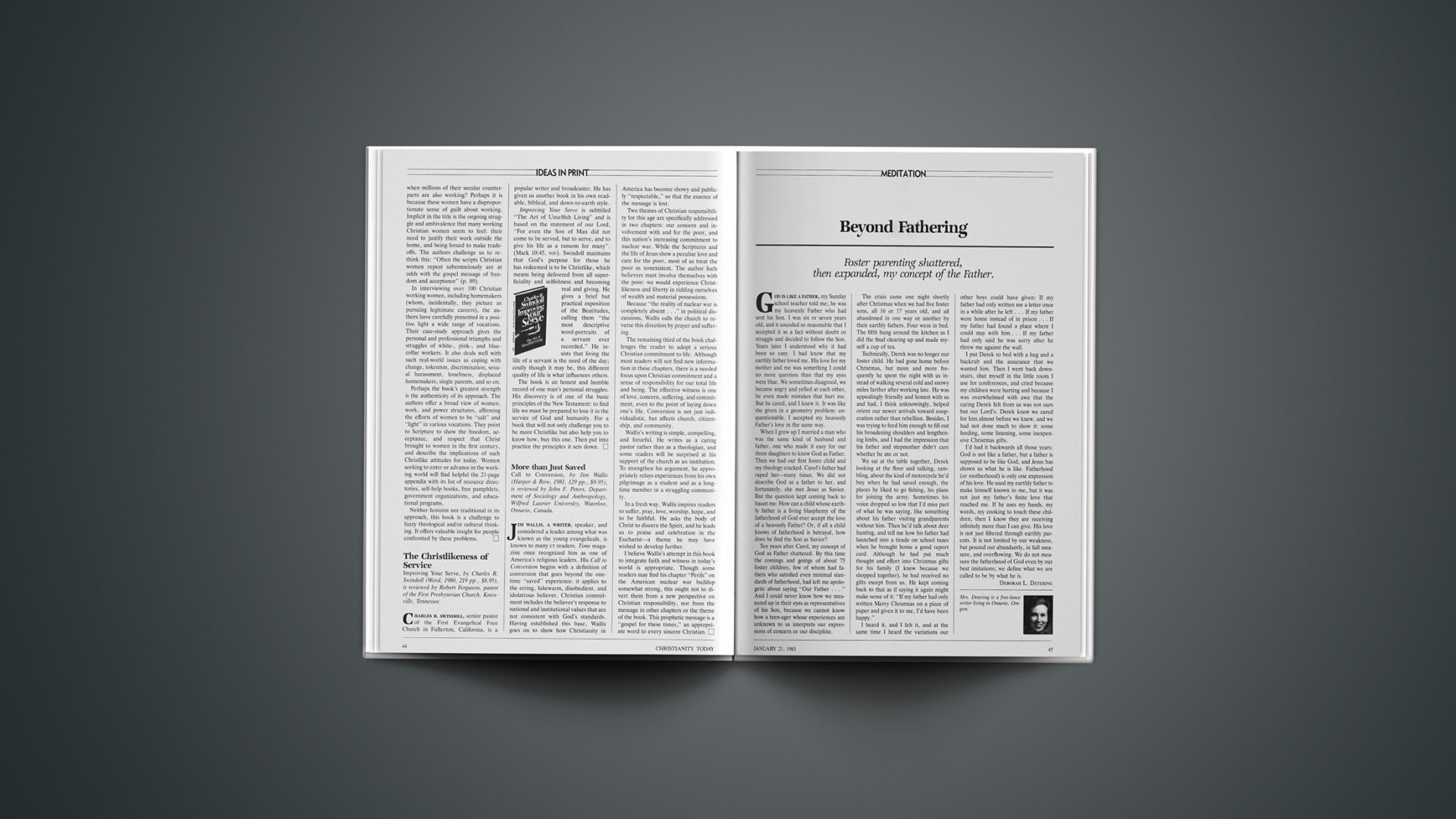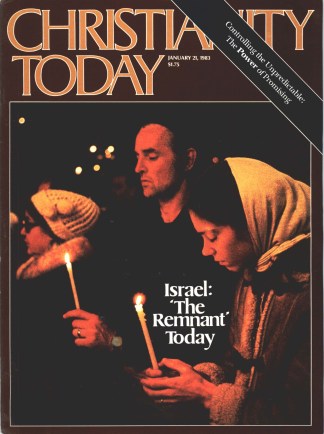Foster parenting shattered, then expanded, my concept of the Father.
God is like a father, my Sunday school teacher told me; he was my heavenly Father who had sent his Son. I was six or seven years old, and it sounded so reasonable that I accepted it as a fact without doubt or struggle and decided to follow the Son. Years later I understood why it had been so easy. I had know that my earthly father loved me. His love for my mother and me was something I could no more question than that my eyes were blue. We sometimes disagreed, we became angry and yelled at each other, he even made mistakes that hurt me. But he cared, and I knew it. It was like the given in a geometry problem: unquestionable. I accepted my heavenly Father’s love in the same way.
When I grew up I married a man who was the same kind of husband and father, one who made it easy for our three daughters to know God as Father. Then we had our first foster child and my theology cracked. Carol’s father had raped her—many times. We did not describe God as a father to her, and fortunately, she met Jesus as Savior. But the question kept coming back to haunt me: How can a child whose earthly father is a living blasphemy of the fatherhood of God ever accept the love of a heavenly Father? Or, if all a child knows of fatherhood is betrayal, how does he find the Son as Savior?
Ten years after Carol, my concept of God as Father shattered. By this time the comings and goings of about 75 foster children, few of whom had fathers who satisfied even minimal standards of fatherhood, had left me apologetic about saying “Our Father …” And I could never know how we measured up in their eyes as representatives of his Son, because we cannot know how a teen-ager whose experiences are unknown to us interprets our expressions of concern or our discipline.
The crisis came one night shortly after Christmas when we had five foster sons, all 16 or 17 years old, and all abandoned in one way or another by their earthly fathers. Four were in bed. The fifth hung around the kitchen as I did the final clearing up and made myself a cup of tea.
Technically, Derek was no longer our foster child. He had gone home before Christmas, but more and more frequently he spent the night with us instead of walking several cold and snowy miles farther after working late. He was appealingly friendly and honest with us and had, I think unknowingly, helped orient our newer arrivals toward cooperation rather than rebellion. Besides, I was trying to feed him enough to fill out his broadening shoulders and lengthening limbs, and I had the impression that his father and stepmother didn’t care whether he ate or not.
We sat at the table together, Derek looking at the floor and talking, rambling, about the kind of motorcycle he’d buy when he had saved enough, the places he liked to go fishing, his plans for joining the army. Sometimes his voice dropped so low that I’d miss part of what he was saying, like something about his father visiting grandparents without him. Then he’d talk about deer hunting, and tell me how his father had launched into a tirade on school taxes when he brought home a good report card. Although he had put much thought and effort into Christmas gifts for his family (I knew because we shopped together), he had received no gifts except from us. He kept coming back to that as if saying it again might make sense of it: “If my father had only written Merry Christmas on a piece of paper and given it to me. I’d have been happy.”
I heard it, and I felt it, and at the same time I heard the variations our other boys could have given: If my father had only written me a letter once in a while after he left … If my father were home instead of in prison … If my father had found a place where I could stay with him … If my father had only said he was sorry after he threw me against the wall.
I put Derek to bed with a hug and a backrub and the assurance that we wanted him. Then I went back downstairs, shut myself in the little room I use for conferences, and cried because my children were hurting and because I was overwhelmed with awe that the caring Derek felt from us was not ours but our Lord’s. Derek knew we cared for him almost before we knew, and we had not done much to show it: some feeding, some listening, some inexpensive Christmas gifts.
I’d had it backwards all those years: God is not like a father, but a father is supposed to be like God, and Jesus has shown us what he is like. Fatherhood (or motherhood) is only one expression of his love. He used my earthly father to make himself known to me, but it was not just my father’s finite love that reached me. If he uses my hands, my words, my cooking to touch these children, then I know they are receiving infinitely more than I can give. His love is not just filtered through earthly parents. It is not limited by our weakness, but poured out abundantly, in full measure, and overflowing. We do not measure the fatherhood of God even by our best imitations; we define what we are called to be by what he is.
DEBORAH L. DETERING1Mrs. Detering is free-lance writer living in Ontario, Oregon.










